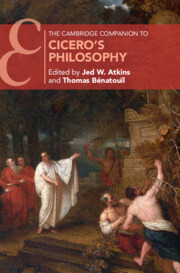Book contents
- The Cambridge Companion to Cicero’s Philosophy
- Series page
- The Cambridge Companion to Cicero’s Philosophy
- Copyright page
- Dedication
- Contents
- Contributors
- Preface
- Cicero’s Philosophical Works
- A Note on Abbreviations
- Introduction
- Chapter 1 Cicero’s Philosophical Writing in Its Intellectual Context
- Chapter 2 The Ciceronian Dialogue
- Chapter 3 Philosophy in Cicero’s Letters
- Chapter 4 Philosophy in Cicero’s Speeches
- Chapter 5 Cicero and the Creation of a Latin Philosophical Vocabulary
- Chapter 6 Cicero and Plato
- Chapter 7 Cicero’s Academic Skepticism
- Chapter 8 Cosmology, Theology, and Religion
- Chapter 9 Determinism, Fate, and Responsibility
- Chapter 10 Cicero on the Emotions and the Soul
- Chapter 11 Ethical Theory and the Good Life
- Chapter 12 Nature and Social Ethics
- Chapter 13 Philosophy, Rhetoric, and Politics
- Chapter 14 Cicero’s Republicanism
- Chapter 15 Empire, Just Wars, and Cosmopolitanism
- Chapter 16 Cicero and Augustine
- Chapter 17 Cicero and Eighteenth-Century Political Thought
- Chapter 18 Cicero and Twenty-First-Century Political Philosophy
- Bibliography
- Index of Cicero’s Texts
- General Index
- Series page
Chapter 9 - Determinism, Fate, and Responsibility
Published online by Cambridge University Press: 08 December 2021
- The Cambridge Companion to Cicero’s Philosophy
- Series page
- The Cambridge Companion to Cicero’s Philosophy
- Copyright page
- Dedication
- Contents
- Contributors
- Preface
- Cicero’s Philosophical Works
- A Note on Abbreviations
- Introduction
- Chapter 1 Cicero’s Philosophical Writing in Its Intellectual Context
- Chapter 2 The Ciceronian Dialogue
- Chapter 3 Philosophy in Cicero’s Letters
- Chapter 4 Philosophy in Cicero’s Speeches
- Chapter 5 Cicero and the Creation of a Latin Philosophical Vocabulary
- Chapter 6 Cicero and Plato
- Chapter 7 Cicero’s Academic Skepticism
- Chapter 8 Cosmology, Theology, and Religion
- Chapter 9 Determinism, Fate, and Responsibility
- Chapter 10 Cicero on the Emotions and the Soul
- Chapter 11 Ethical Theory and the Good Life
- Chapter 12 Nature and Social Ethics
- Chapter 13 Philosophy, Rhetoric, and Politics
- Chapter 14 Cicero’s Republicanism
- Chapter 15 Empire, Just Wars, and Cosmopolitanism
- Chapter 16 Cicero and Augustine
- Chapter 17 Cicero and Eighteenth-Century Political Thought
- Chapter 18 Cicero and Twenty-First-Century Political Philosophy
- Bibliography
- Index of Cicero’s Texts
- General Index
- Series page
Summary
In his treatises De divinatione and De fato, Cicero discusses the possibility of the prediction of future events. His understanding of divination in these philosophical works differs significantly from accepted Roman practice. Thus, De divinatione should not be read as a handbook on Roman divination. Rather, it should be read alongside De fato as an exhortation to act in the service of the res publica after the death of Caesar. Rather than denying outright that divination is real, Cicero seeks to refute the more superstitious divinatory practices current in Rome, all of which he attaches to the individual rather than to the political community to which he has dedicated his life. Among these superstitious views are the belief that humanity is subject to impersonal fate and therefore that human responsibility is curtailed. In writing for a Roman audience, Cicero denies both the notion that men cannot be responsible for their own actions, thus rejecting the idea of fate, as well as the existence of divination in the context of a deterministic worldview.
- Type
- Chapter
- Information
- The Cambridge Companion to Cicero's Philosophy , pp. 134 - 149Publisher: Cambridge University PressPrint publication year: 2021

